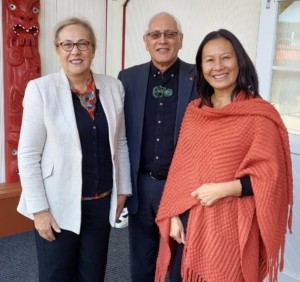
EIT Professor of Māori and Indigenous Research David Tipene-Leach (centre) with Professor Linda Tuhiwai Smith (left) from the University of Waikato and Professor Jenny Lee-Morgan (right) from Unitec, who were the guest speakers at EIT’s Rangahau Māori research forum last week.
Developing the potential of Rangahau Māori (Māori research) and moving it away from the constraints of western research methodology was the focus of a research forum at EIT’s Taradale campus last week.
Rangahaua te Pō-uriuri (Developing our Potential), hosted by EIT Professor of Māori and Indigenous Research David Tipene-Leach at Te Ara o Tāwhaki, Te Ūranga Waka, at EIT’s Marae in the School Māori Studies last Wednesday. The forum looked at ways to spearhead the growth of Rangahau Māori in Hawke’s Bay and Tairāwhiti
To help unlock the ‘potential’ in this indigenous research approach, two leading Māori academics addressed the forum. Professor Linda Tuhiwai Smith is an educationalist from University of Waikato and the author of the ground-breaking book, Decolonizing Methodologies: Research and Indigenous Peoples, which was first published in 1999, but is being released as a third edition this year.
Joining her was Professor Jenny Lee-Morgan, the founding Director of Unitec’s Ngā Wai ā te Tūī Māori and Indigenous Research Centre, who has a distinguished track record of teaching and kaupapa Māori research.
In her address, Professor Tuhiwai Smith said the researcher she is today was not the one she started out as 22 years ago because everyone develops as they get experience. There has also been a change in attitude to Rangahau Māori.
“Twenty-two to 25 years ago, this event would simply not have happened. There was no structure in place to talk about Rangahau.”
“The journey has included a fightback of our knowledge and a fightback to reclaim our knowledge.”
She says that early in her career she realised that she did not want her research framed as deficit research.
“I did not want my research to be about why Māori are not achieving in secondary school or their truancy.”
“This was not my experience. What I was seeing as an academic and what I was seeing in life did not gel.”
Professor Tuhiwai Smith says her book, which is a world-leading academic piece, tells the story about a form of power and knowledge that emerged out of Europe.
“It shows how the power and knowledge developed into a global system that grew more insatiable and powerful and tried to destroy Māori and indigenous people, take their lands and erase their knowledge systems.”
“The story shows how that system took hold and was passed down into a network of institutions that dominate society right through to the present day.”
Professor Tuhiwai Smith, who is widely known as the Mother of Indigenous Studies, says the fightback saw indigenous people across the world get together and begin to challenge what had happened to them.
“This shows how reclaiming indigenous knowledge and language can inspire us to research for what has been taken or destroyed and put it back together again to help us heal and be whole again.”
Professor Lee-Morgan says pūrākau (storytelling) is a way to counter the existing narrative and share Māori stories.
Her doctoral study ‘Ako: Pūrākau of Māori Teachers’ Work in Secondary Schools’ was seminal in the methodological development of pūrākau as narrative inquiry.
She said Pūrākau continues to work in our everyday lives and can be used in the context of research.
“Pūrākau has the depth and ability to teach and learn from wherever we’re at to remind us of the names, the stories, and the fights etc. of our people.”
The idea of bringing who Māori are into what they do, in safe places within this research space is fundamental. “Our words are critical to thinking about our world.”
Professor Lee-Morgan suggested that getting into community networks and getting a Rangahau Unit up and running are fundamental developmental steps.
Professor Tipene-Leach noted “rangahau is central to Te Pūkenga (the newly formed New Zealand Institute of Skills and Technology) and to EIT, if we are to be true to our mandate and to our community”.

